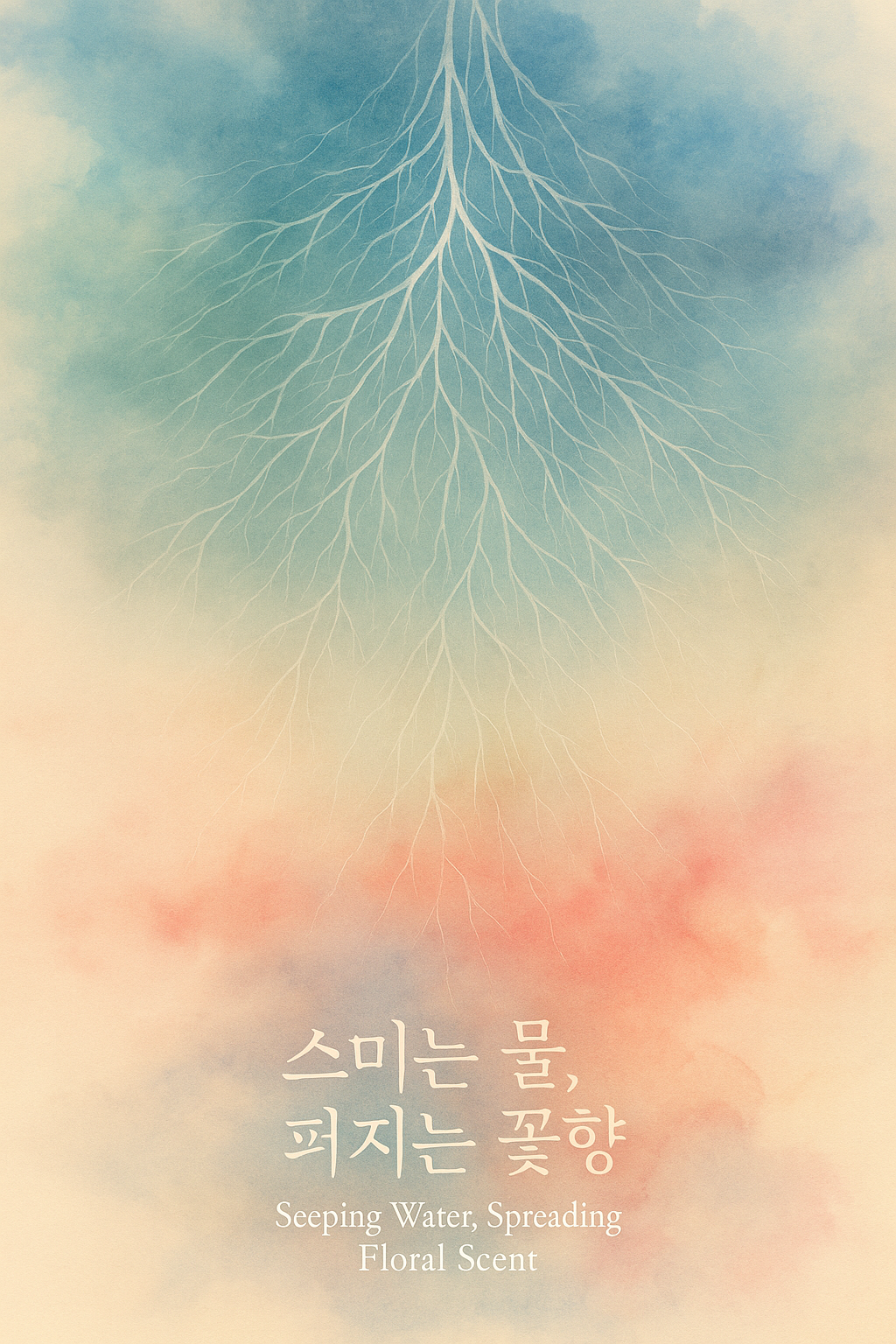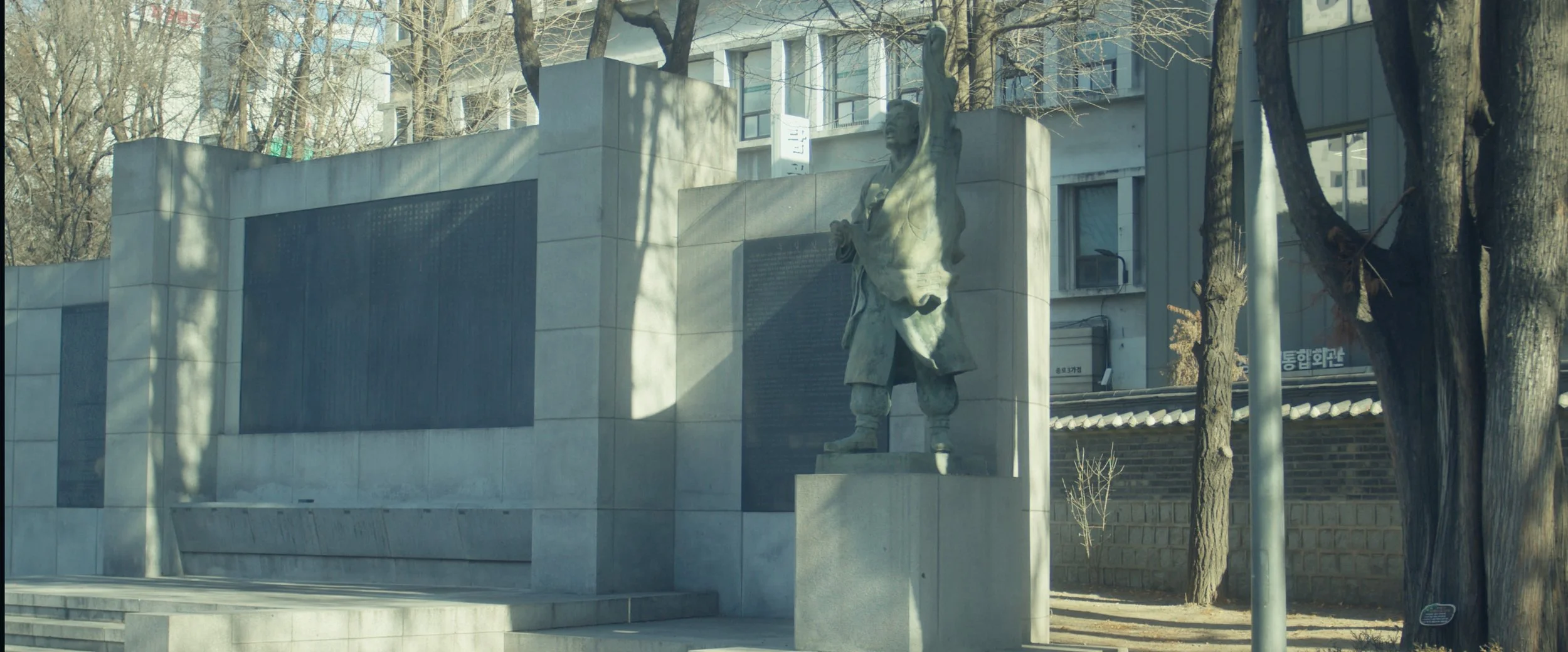Seeping Water, Spreading Floral Scent
FILM LOGLINE
A Korean-Japanese photographer, long severed from Korea by childhood trauma, returns to Jongno, where history lingers, for her grandmother’s funeral and must confront an anti-Japanese gallerist—and the question of whether scattered roots can bloom.
BEHIND THE SCENES
It all began with a sign I caught while sitting in a car, driving through Seoul’s Jongno district—a place I found myself returning to frequently for reasons I didn’t yet understand. The sign read: “Welcome to Jongno, the root ‘본(本)’ of the world.” That phrase struck something in me. It lingered. I didn’t realize it then, but that line would become a quiet ignition for the ideas that would later define my short film.
My initial protagonist was nothing like me—she was in her 40s or 50s, divorced, and had a son being raised by her Japanese mother. Her visit to Korea was motivated by divorce paperwork involving her soon-to-be ex-Korean husband. As compelling as her story was, I felt paralyzed. Friends who read the draft told me: “This feels distant from you.” And they were right. I hadn’t lived through divorce or motherhood. I was trying to speak from a place I hadn’t yet known.
So I took a step back. Slowly, I reimagined the character into someone in her late twenties—closer to my age, with a gaze and confusion I could understand. At some point in that evolution, the character picked up a camera. I hadn’t planned it, but as soon as I wrote it, it just felt right. Looking back at an old development document for the short film that I shot last year that I drafted, I found a line that I completely forgot that I wrote: “The protagonist explores a city with a video camera.” Somehow, even without rereading that note, the idea returned. That quiet persistence of ideas fascinates me—how the thoughts most essential to me have a way of circling back, unprompted. Initially, I had titled the film 본 本 (Root)—but it felt a bit too literal. Instead, I turned that concept into the protagonist’s name: Motoka (もとか / 本香), meaning “root fragrance” or “original fragrance.” It felt fitting—subtle, poetic, and intrinsically tied to her journey. The kanji character 本 carried the weight of origin and scent—the invisible trace that lingers seemed like the perfect metaphor.
The road to production was far from smooth. Getting permits for Gwanghwamun Square required submitting a detailed overview, exact time slots, crew count, and location breakdown weeks in advance—even for a tiny four-person crew. But the genuine hurdle was Tapgol Park. The committee that reviews permit applications meets just once a month, and even to be considered, I had to submit my request on Thursday a month before I hoped to shoot. That deadline nearly broke me. I sent desperate emails, made pleading phone calls, and begged in a way that surprised me. I don’t remember ever humbling myself that much for anything. But Tapgol was irreplaceable. It was the only switch I needed—tied to Korea and Japan’s fraught legacy. When the permit finally came through, it wasn’t just a logistical victory—it felt like I had earned my place as someone telling a story that mattered.
Production came with its challenges. Renting the hanok space came with a strict warning: “If even a drop of colored liquid touches the hanji walls, you’re paying at least 500,000 won.” I warned everyone, but someone still spilled coffee. We lost 700,000 won at that moment. I had also planned a nighttime scene in the hanok with snowfall—a quiet, poetic touch. But the snow came the day after we wrapped that scene. I remember staring out the window, thinking how perfect it would’ve been. And yet, nothing compared to the self-doubt that crept in. After we wrapped, I questioned everything: Do I have the stamina to be on set and direct? Do I know what I’m doing on set? Can I make decisions when it matters most? Despite spending hours on shot decks and prep, I still felt immobilized, especially during the first scenes at Tapgol Park on our first day of shooting. However, I still like to think there was some progress and improvement. The crew was more organized and slightly larger than when I shot Haebangchon. I was more prepared during pre-production. I had shot references, decks, and budget breakdowns. It still wasn’t perfect, but it was more than before. Maybe I’m not yet where I want to be, but I’m moving forward.
Email me for access to the full film.
Frames








